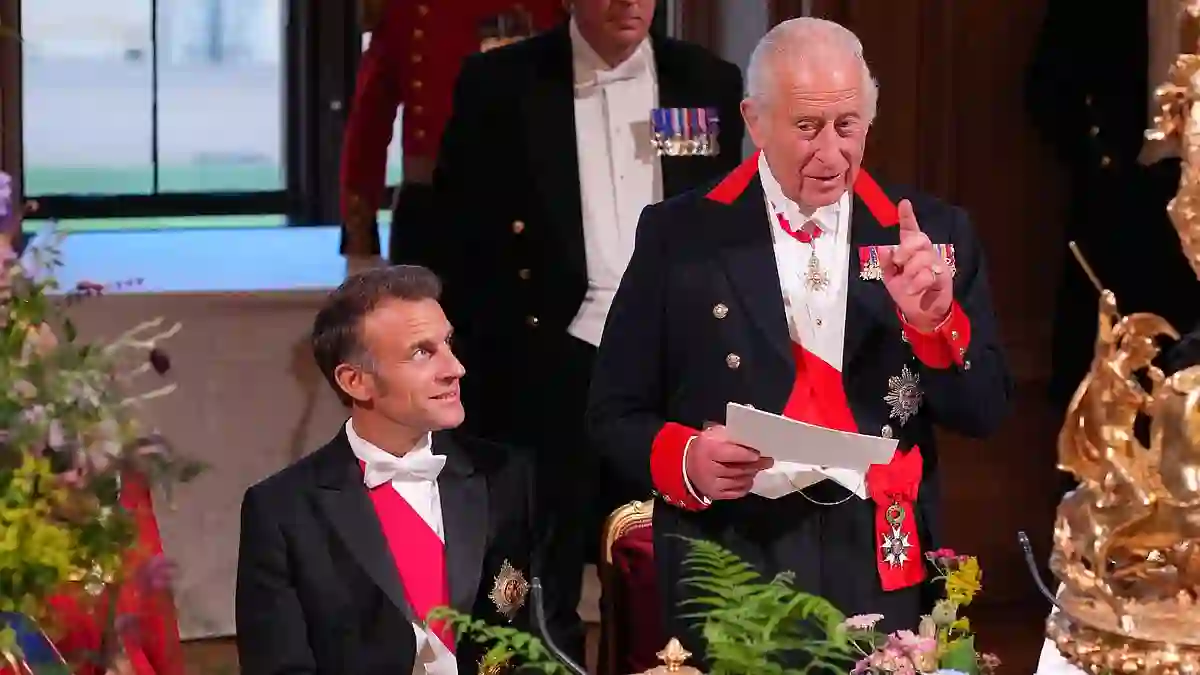You know that uneasy feeling you get when everything looks grand on the surface but feels hollow underneath? That was the vibe at the Windsor Castle banquet last Tuesday.
The setting was stunning—gold, red velvet, candlelight elegance—and among the guests? Mick Jagger, rock royalty turned cultural diplomat, apparently.
But what was this lavish display really meant to prove?
Was it Britain flexing its so-called “soft power”? Because if that’s all we’ve got left—ceremonial dinners and celebrity guests—then we might want to start asking deeper questions about where we’re really headed as a nation.
King and President in the Spotlight, but What’s the Point?
It’s often said that France is a monarchy pretending to be a republic, while Britain is a republic pretending to be a monarchy.
Watching the regal performance, you couldn’t help but feel the truth in that joke.
President Macron managed to carry the air of a commander—cold, confident, even smug—while our King Charles, ever dignified but far from decisive, seemed caught in a tidal wave of modern expectations.
It was a night full of pomp, but beneath the sparkle lay a sense of desperation—an attempt to appear powerful without having much actual power left.
Britain Plays Host While Migrants Keep Coming Ashore
And as Britain hosts glittering state dinners, it quietly plays another, much less glamorous role: France’s unofficial migrant processing center.
With Sir Keir Starmer’s government scrapping the Rwanda deportation scheme, the flow of migrants crossing the Channel has not slowed.
In fact, Britain now seems to serve as a convenient place for France to direct those it would rather not deal with.
Migrants arrive freely, welcomed ashore by British authorities who should—at least on paper—be working to prevent exactly that.
It’s as if the rules no longer apply.
France and Britain Share the Blame for This Crisis
Of course, none of this happens in a vacuum. Both France and Britain have played major roles in sparking the chaos that has driven mass migration over the past two decades.
France may have stayed out of Iraq, but it jumped headfirst into Libya and Syria, alongside Britain.
Those wars didn’t just fail—they left vast regions in ruins and opened routes for millions of displaced people seeking refuge.
That chain of events—set in motion by reckless Western interventions—has altered the social fabric of Europe.
And neither country seems to have a clue what to do next.
Macron’s France Tightens Control at Home
Interestingly, while Macron was busy shaking hands in Windsor, back in Paris, police were raiding the National Rally’s headquarters.
The party—long controversial, but also France’s largest opposition group—was accused of campaign finance violations.
Whether you support them or not, it’s hard not to see this as politically charged.
And it wasn’t just France. Brussels announced an investigation into the broader Identity & Democracy group, and in Germany, the intelligence agency officially labeled the anti-immigration AfD party as extremist, giving the state power to monitor and infiltrate them.
When Dissent Is Dismissed, Extremes Fill the Gap
Now, let’s be clear: some of these groups have deeply troubling platforms.
But here’s the bigger issue—Europe’s political elites have spent three decades ignoring the fears of ordinary people, especially the poor.
Concerns about jobs, housing, cultural change, and war have too often been dismissed as racist or backwards.
Meanwhile, those same elites have overseen economic stagnation, open-ended wars, and record-breaking migration.
It’s no wonder fringe parties are gaining ground.
Ukraine and the Risk of a Bigger Collapse
And now, as if Europe hadn’t learned enough from recent disasters, there’s another expensive, open-ended war—Ukraine.
Leaders are pouring billions into the conflict, often with borrowed money, while ordinary people are left to deal with inflation, insecurity, and dwindling trust in institutions.
How long can that imbalance last? And what happens when these populist movements, born out of frustration, start gaining real power? Can police raids and surveillance stop a political shift already in motion?
The Decline of Liberal Europe Is No Longer Hypothetical
It’s starting to feel like we’re watching the slow, strange death of liberal Europe—not from some foreign enemy, but from within.
As we cling to outdated rituals and superficial shows of unity, the foundations underneath are crumbling.
And those who dare point it out are treated as enemies of progress.
Future generations will look back at these glittering dinners and smiling photos and see what we failed to—that we were dancing on the edge of collapse, too distracted by ceremonial swords and designer gowns to notice the volcano rumbling beneath our feet.
